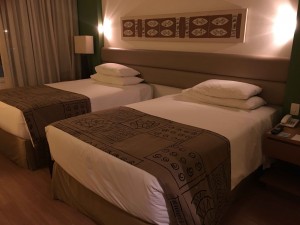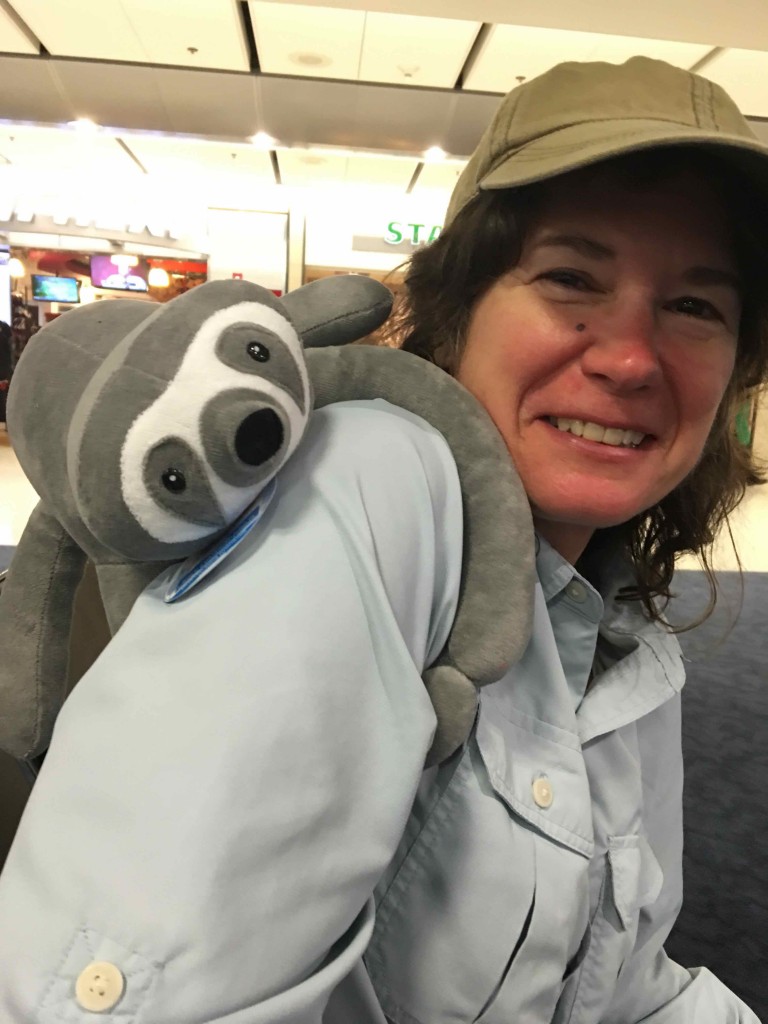We are up at five and finish packing, which consists of putting all sorts of damp clothes into a large duffle bag, all of which are starting to smell like wet athletic socks that have been storedin a locker for a month. Along with odiferous clothes are a bunch of unused, unopened lures Mark thought we’d have time to try but never did…just like our first trip. We go to breakfast with our carry-on luggage in tow, leaving our heavy bags for the guides to load into a boat. We’ve seen the last of our little cabin.
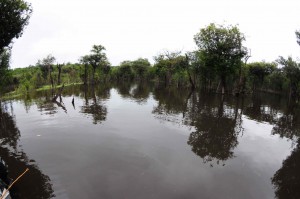
Now, the funny thing about having stomach issues is that instead of doing what I usually do at camp in the morning—look around to see what Amazonian bird might have shown up on a nearby tree and look for pink dolphins playing in the water–my mind is instead focused on the singular issue of bathrooms. Once kicked out of our cabin, where, I ask, will we have access to a bathroom? Alejandro says we can use the spare cabin. I secretly cheer.
At breakfast, conversation turns to toilet paper and Dr. Coz says his wife wouldn’t like it here because of the toilet paper and how you have to reach up into the toilet paper holder and get it from the dispenser, with one’s head practically between one’s knees. Struggling to get the t.p. would put his wife right over the edge. Curt says that one of the things he’d un-invent would be those toilet paper holders. He goes on to say that the first thing he does upon sitting upon the pot is “reach way up there, grab the end and pull and pull until I have a big pile on my lap so I’m ready to go.”

Dr. Bob says his wife goes through so much toilet paper he should invest in it. That led them to say that all women use a lot more toilet paper than men and they’re quite astounded by that. I’m intent to keep an eye on the “spare cabin” to make sure it hasn’t disappeared and make a lame effort to defend women.
As we eat our breakfast, conversation turns to the “me generation” and how bad things have gotten with people expecting to get things from the government and how nobody does anything for themselves anymore. Curt also says the next president is important because of the number of old supreme court justices on the bench. He could not have known that chief justice Antonin Scalia would die within 2 weeks after our return.
Our breakfast done, I stop by the spare cabin and chat with my gut, asking it to behave itself the over 2-hour ride back on the airplane to Manaus, because there is no bathroom in the float plane. Little did I know that would be the least of my worries.
The guides have loaded our luggage into two boats and there are two boats available to transport anglers to the plane. Mark and I get into Sappo’s boat and we wait no more than five minutes for the plane to fly low over the water to check out the scene. The plane banks, makes a quick turn and lands on the water.
As the plane lands, Mark notices that the plane puts up a lot more water than previous float planes we’ve seen land on water. I’m not paying a lot of attention, because the lenses on my camera haven’t acclimated yet to the warm weather—they were inside the air conditioned cabin over night and are all fogged up in the hot, humid morning air. I wipe off the camera and lens and take one shot of the plane coming in because it’s not like I see float planes every day.
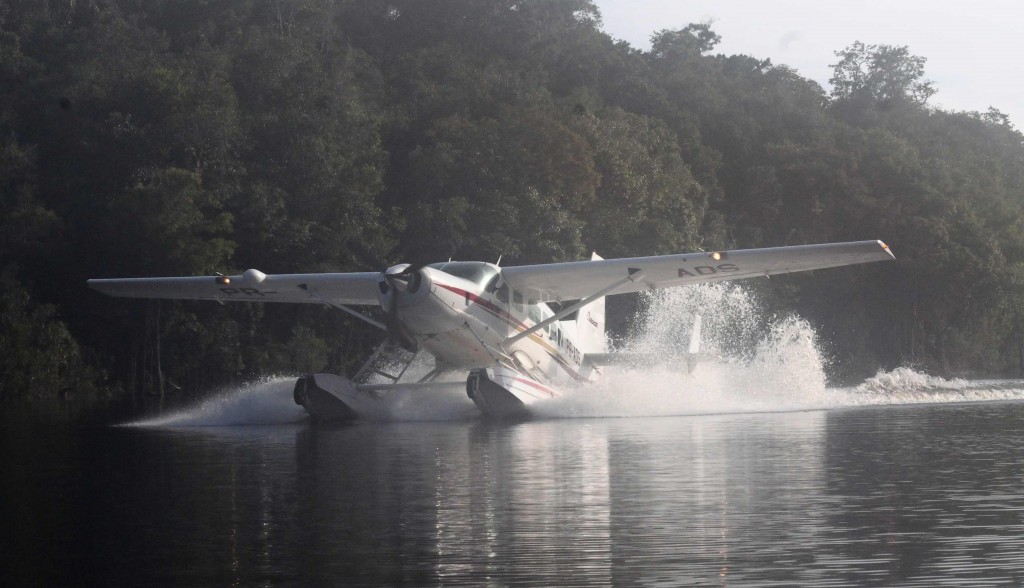
The plane comes to a standstill and I take another photo, still concerned about my fogged up lens. The eight new anglers get out of the plane and into two empty boats motored by two other camp staff. While we wait and watch them, Bobby shows me his photo of the plane and I just nod, still not catching on. The two boats head to camp with the new guests while Sappo and the other guide move our boats into position on either side of the plane.
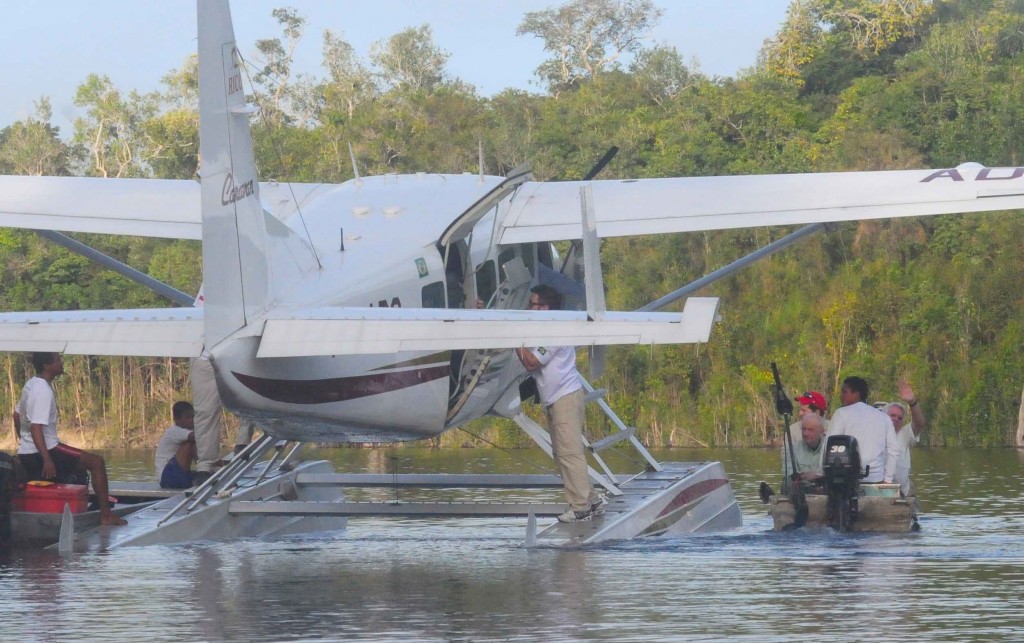
Mark, Bobby, Dr. Bob, Curt and I all get into the plane and settle into our seats, Bobby and Curt in the front bench seat, Mark, Dr. Bob and I in seats behind them. Steve, John and Dr. Coz are on the outside of the plane, either in the other boat or on the float, but I’m in my own la-la land, fussing with my camera lens. It’s only after John says that he is standing in water over his ankle while standing on the float did it finally register that the plane is listing to the back and to the left. The plane floats are taking on water. In other words, we are sinking.
Still in disbelief, I click on the view button on my camera, look at the photo I took and just about get sick at what I see. How did I not notice?
I tuck my camera away and calmly suggest that Mark take his seatbelt off in case we have to get out quickly. I also move our carry-ons to the back of the plane. As I am plotting our escape, warning lights begin flashing on the dashboard, along with warning buzzers. In an instant, my breathing increases, my butt puckers, and I’m fighting back a voice in my head that’s saying, “GET OUT!” I’m about to get out when the pilot suddenly appears with a pump in his hand—a two-foot high, plastic gadget—which he attaches to the one of the pontoons and uses to pump water. As he is pumping out the float, Curt is sharing calculations about how much water is being pumped and how much extra weight we might be carrying with us during lift off, should we actually get to lift off.
I’m pondering whether to thank Curt for that information when suddenly, just as quickly as the pilot started pumping water on one side of the plane, he appears to fly across the front of the floats and pumps water out of the other side. Moments later, he tucks the pump away, reaches inside the front door, turns the warning lights off, tells the other three guys to get in quickly, and without any word about putting seat belts on or anything about safety, cranks up the engine and shuts the door. The co-pilot also jumps in and shuts his door. Without bothering to look at checklists, the pilot quickly guides the plane towards the camp, where, curiously, the entire camp staff are watching. We do a tight turn-around and start heading down the long open stretch of water while the pilot pumps the steering yoke up and down, which makes the front of the plane go up and down. We’d had to suffer through this on the Amazon the first time to get lift under the wings, but this time it’s beyond scary because the back of the floats are underwater and the front of the plane way up in the air. The more the pilot pumps, the higher up the plane seems to rise, the lower it feels we are in the water. The voice inside my head yelling, “STOP THE PLANE! LET ME OUT!’ is getting louder, and it’s all I can do to not scream when I look out the side window and see that instead of the guides taking the boats back to camp like they usually do, they are zooming along side our plane in their boats, faces looking intently ahead, worried. I nod to Mark and as he looks out at the guide, I say, “Perhaps to pull our bodies out?” Then I tell him I love him and hang tightly onto his hand.
Seating in the plane:
Pilot Co-pilot
Curt, John, Bobby on a bench seat
Dr. Bob in a solo seat; an open space, Me and Mark in a shared seat
Steve behind us
Dr. Coz in the way back
As the guide throttles his boat alongside the plane and the pilot is pumping up and down, each man around me has worry oozing from his every pore. On and on we bounce like this, for at least 30 seconds, maybe longer, and it seems to me all we are doing is making waves and giving the floats more time to fill with water. In those 30 seconds, I revisit my life and all the big fish that got away and wonder why I’m not having a hot flash, and wonder if it would it be better if I had a super hot flash and passed out and missed out on my own demise?
Then suddenly, we reach flat water, which, for some reason, is a place where we are beyond or on top of? the waves we are creating, and can finally accelerate beyond what Curt said later, was 40 mph (he was watching the controls the entire time). The guide boats disappear from view, no longer able to keep up, which I feel is a good sign…unless we don’t make it off the river, in which case, they better keep following.
As we try to accelerate more an more, what worries me–besides flipping over backwards and drowning if we go upside down, and piranhas finishing me off if I don’t drown, and the fact that I’m not wearing my sports bra in all this bounce–is that we keep going and going down the river, and I can’t see out the front window because the back of the plane is down so far in the water, and I don’t know how much straight river we actually have left before there’s a bend in the river. We go on and on, accelerating, until finally, we rise off the water—maybe about ten feet—only to drift back down towards the water again. As the plane drifts back down—in that few moments in space—I recall that our trip to 2013 was delayed because the float plane that was supposed to have taken us out of the jungle clipped trees and half of one wing got torn off. We’d waited for six hours while another plane came in to take the gringos off that river, took them to our air field and finally, took us to Manaus. So, knowing that one does not always clear the trees in the jungle, I am holding my breath and my heart is racing and I’m biting my pursed lips and I’m not liking that John is capturing this all on video, when the pilot pulls up again. This time, we continue rising higher and higher. When I look out the left side of the plane, all I see is trees….as if we didn’t have a lot of straight river left.
We are just above the trees and sighing out loud when we hear from the back of the plane, Dr. Coz yelling: “I think I might have crapped my pants!”
We all chuckle nervously. I squeeze Mark’s hand. Dr. Bob, sitting next to me, pulls out this orange and black gizmo called SPOT which he takes with him on trips so he can be rescued. He says he had his hand on the button the whole time we were taking off, which amazes me because he was chatting to me about something most of the time. I notice that there’s another SPOT on the ceiling between the pilot and co-pilot. So at least if we’d gone down, someone would have spotted us quickly…and pulled out whatever of our body parts could be sent to our loved ones.
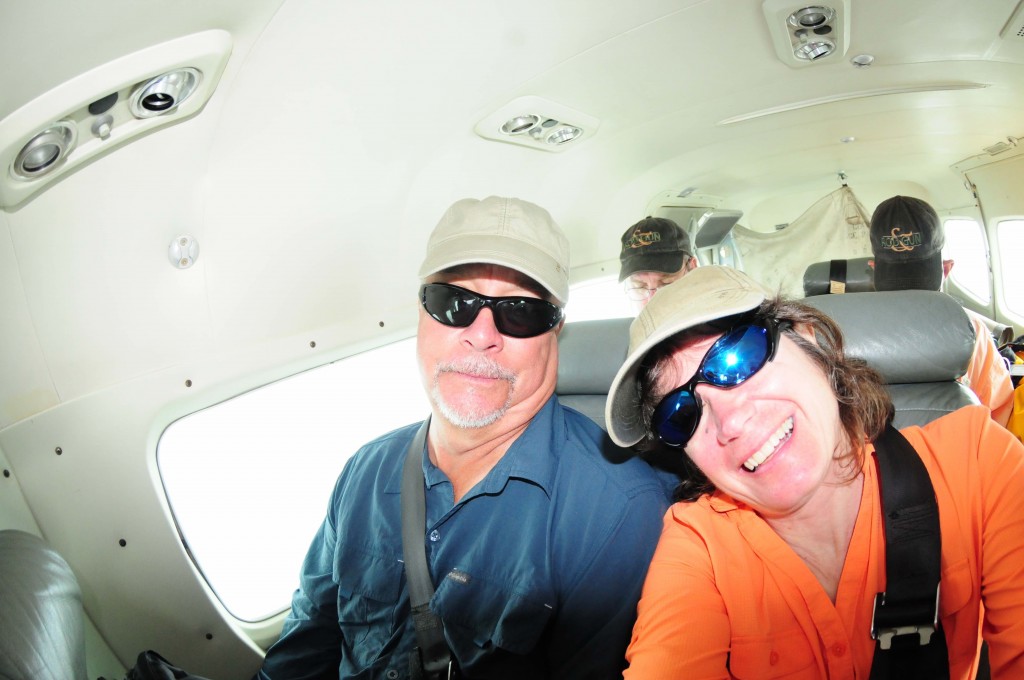
The flight is smooth until about half way back when we get into clouds and the windshield is covered with raindrops. The pilot hardly notices, engaged again in great conversation with the co-pilot and gesturing with his hands. At one point, he takes off his headset and turns around in his seat to answer Curt’s question about the dynamics of getting us off the water. Afterwards, he puts his headphones back on and goes back to chatting with the co-pilot.
We experience a couple of drops in altitude as we hit turbulence, but again, the pilot is unbothered, so I decide to be unbothered, too.
A little over two hours later, the weather breaks for us to see our way down the runway in Manaus. I am relieved to be on the ground and, after waiting politely behind the Brazilian man who guided us back inside the airport, I make a beeline to a toilet to contribute more to the waste stream. When I return to the lobby, Bobby is pushing a cart with my luggage on it, along with a lot of other luggage, and all I have to do is head into the shuttle. Two women are operating the shuttle; we learn later that Jon was called away and could not be there due to a funeral.
In the shuttle on the way to the motel, Curt shares that the pilot likely fully fueled up before he left Manaus to save time and make it such that he could do all his trips without delay. So, he was weighted down with extra fuel he didn’t need for a 1.5 hour ride. Add excess water in the floats with having excess fuel and it’s no wonder our takeoff was so tough.
We get keys for a room at the motel, and once again, I’m hooked up with another guy. We exchange keys so I can be with Mark. We drag our soggy, smelly stuff up to our room, shower, and take a nap…in a double bed, together. There’s nothing like a nice double bed after a week in the jungle on a twin bed…while my spouse was in a twin across the aisle.
Later, at lunch, Curt says he wasn’t worried about John on the flight off the water because if the plane went down, John could swim like a fish. But he was worried about caiman and piranhas maybe eating John. We try to convince Curt that piranhas wouldn’t have eaten John if he went for a swim, then we admit that piranhas do tend to munch on people in confined spaces…like upside down airplanes. Caiman, though, well, all bets are off with them when swimming.
Bobby says that he almost asked to get off the plane. He, Curt, Steve and Coz have all done this 13-15 times on the Amazon, so clearly this was one of the worst flights. Bobby shares another memorable flight, where they smelled diesel fuel and it was dripping inside the plane. Mark and I counter with our last trip to Canada and how the float plane blew a “jug” or cylinder and the oil splayed all over the windshield and how we landed on the water just as the engine died, then were dragged to shore by other guides using boats and ropes. Reflecting on the fact that our last two float trips were hair-raising, I announce that I can happily stay off float planes for a long time.
We go with Curt and John to a mall next door and it’s a mass of humanity that I wasn’t mentally prepared for, having just come out of the jungle. People are moving in every direction in stores that are packed like our malls were twenty years ago, and only now so at Christmas. We ask a lady where the pharmacy is, and I loiter outside while the guys go inside, to give Curt some privacy while he picks up whatever it is he came for. As we leave the mall I see a place that I think might have puppies but instead was a place for little kids to play.

As we walk back to the motel, cars and trucks and motorcycles buzz by and tI find it amazing—and crazy–what we get used to in the urban environment in Manaus. Not to mention, it’s super hot.
Back at the motel, we wander up to the top floor where there’s a pool and an open area nearby with lots of trees and shrubs still intact. I go upstairs and get my camera and 85-400mm long lens and spend the next 35 minutes in the sun trying to photograph birds. I see an ani of some kind, a red-billed sparrow, a small brown bird I’ll never be able to identify, a few other birds I’ve not seen before, and a bird that could be a kiskadee or a flycatcher, as there are many that look like it. I finally get a decent shot at a blue tanager, which had deceived me in that village we got stuck in in 2013. Mark reads the paper in the shade.
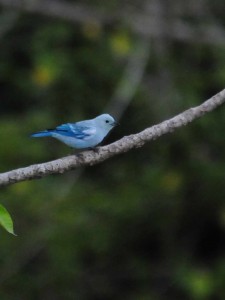
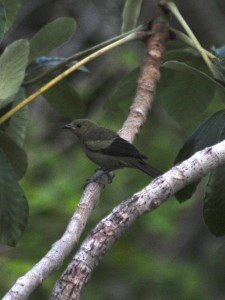
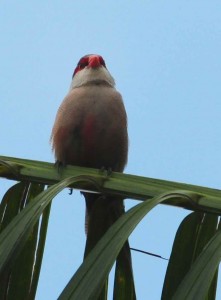
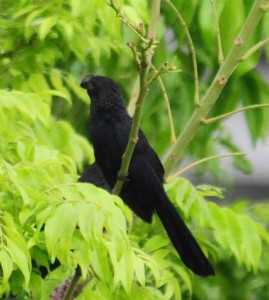
We take another nap and when I wake up I need to do something before being cramped on a plane for many hours. I put on my shorts and go up to the work-out room, and see Steve up there pushing some weights around. I work out for 20 minutes while Mark dabbles on three different pieces of equipment without exerting himself at all.
Later, I do one more birding stint, and finally get a shot at a parrot which lands in a tree far away, in the fading sunlight. Vultures also fly by. As I shoot, it occurs to me that I see more birds in a few hours overlooking a lot in Manaus than I did during one week in the jungle.
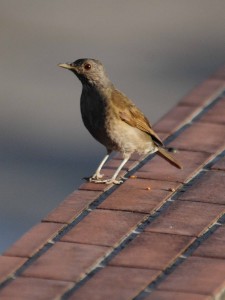
We pack up and head downstairs around 7:00 p.m. for a couple of beers. Afterwards, we go back to the room, shower again, and lounge around until 9:00 when we drag our luggage downstairs and drop it by the front door. The rest of the guys are having beer in the lounge and their stuff is already by the front door.
Before the shuttle shows up at 10:00 p.m., I shake Dr. Bob’s hand and tell him it was a pleasure meeting him and fishing with him. He gives me a big ole hand shake in return.
At 10:00 a brute of a guy loads our stuff in a shuttle van; a woman drives us to the airport alone. It’s a horribly bumpy ride in the back of the shuttle, one we notice more leaving the motel than when we came in. En route the talk is about things like wells and groundwater. At one point someone asks Bobby about his ranch and how many deer he’s harvested this year (all huge brutes) and Bobby says he uses a helicopter to get the deer to spread out so the hunters have a chance at them. Curt says, “I love having a rich friend with a ranch and giant deer. It’s so much fun.”
At the airport, we unload our stuff onto two carts and the woman driver takes off without a word. It’s far more impersonal without Jon around. We check in at a line with few people in it, Curt, Bobby and Dr. Coz in the first class line; the rest of us in the other. We drop our bags off and are happy to do so because they seem to have gotten heavier and smell like jungle rot. We get through customs and security and soon are sitting around the terminal area sharing photos on our cell phones. Well, most of us are—I didn’t recharge my phone. Steve shows us photos of his three Clydesdale horses, one of which he had shipped from somewhere across the country, along with his miniature pony which looks clearly tiny next to the big fellas. Steve also talks about the 12-acre pond he built on his property—sounds like a lovely place.
Curt shows us photos of his family and his two rescued dogs, both mutts. He also shows me a giant rattlesnake that was right outside his backdoor and which he “dispatched with a bit of lead to the head.”
Mark mentions our 16 acres and our new log cabin in Northern Michigan, and shares the realization that it’s on the Black River and we’d fished a tributary of the Rio Negro the first time in the Amazon. We named our new cabin Rancho Rio Negro.
After photos are shared all around, I hit the bathroom, and on the way back, point out to Mark a stuffed sloth a lady was watching for her 8-year-old son. Ten minutes later, Mark returns with my own stuffed sloth. It’s in a plastic bag and I take him out so he can get some fresh air.
On the way back from the bathroom, I pass Coz going to the bathroom. He stops me and says, “So, how much toilet paper did you use?” I stretch my arms out as far as I can and say, “About that much.” He laughs and says, “I thought so.” Such a funny guy.
The announcement to board allows people 60 and older to board first, not first class, not women with children. Many people get on, many of them fishermen. Mark waits for me in spite of qualifying, and we are happy this time because we paid for seats with more leg room without having to change seats. I’m in the middle of three seats and the guy by the window has nothing to say, which also makes me happy. John sits across the aisle; Steve and Dr. Bob a row ahead of us. Mark is in the aisle and John takes the moment to ask Mark why we saw so few birds in the jungle. He also asks: “If I were dropped off at some random spot in the middle of the jungle, what’s the odds that’d I’d discover a new bird or bug or something?” To that, Mark says, “Pretty good.”
I take my contacts out, put my glasses on, put a blanket around me and am about to nod off when a light lunch is served. It’s a sub sandwich with a big wad of bread, single piece of lettuce, two super thin slices of tomato, a micro piece of cheese and some smoked turkey, also thinly sliced. I pass on the chips and give them to Mark; ditto with the fruit. I save the biscuit for later. I’m still seeing what makes my gut happy and hope my new diet of little food does the trick.
The rest of the trip blurs together–landing in Miami, waiting for our luggage to show up, saying good-bye to some great guys we admire and loved hanging out with. Several hours pass slowly at a gate before we fly to Detroit. We land in Miami and wait 45 minutes for a shuttle that never came and finally get pity from another shuttle company who drops us off at Days Inn where we will never stay again due to their poor shuttle service. Then we are in the cold that is the winter of Michigan, driving home, which feels as foreign as the noise and movement and everything else we have to get re-accustomed to. Still unable to make a fist, blisters on my hands, tired beyond belief, I am already missing the simplicity and the danger, the freshness and heat of the jungle.
At home, we are greeted by our two dogs and two cats. All are well behaved until we wake up the next morning to find the dogs have provided an editorial. A little bit of fishing line later, and even their bed is back to normal.

Within a week, I no longer long for normal and wonder when, if ever, we’ll get to return to the Amazon. We caught a total of 1,278 fish that week, 127 of which were 8 pounds or bigger. The biggest of the week was the 19-pounder caught by Dr. Coz. As I look back, I wonder if perhaps what I really long for is a rematch with a bigger fish than his.
After note: Upon returning to the states, I contacted my cousin, Ryan, a pilot, who contacted a sea captain friend on my behalf. He explained the pumping up and down we experienced “helps break the surface tension of the water when you are trying to get up on the step, the step being the area on the float with the least drag and best acceleration. That pumping the yoke process is pretty common when you are on the heavy side. Doesn’t mean they were necessarily doing anything unsafe.” Isn’t that reassuring?
